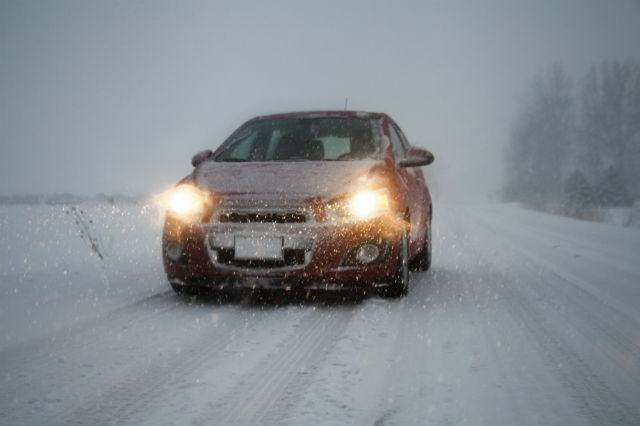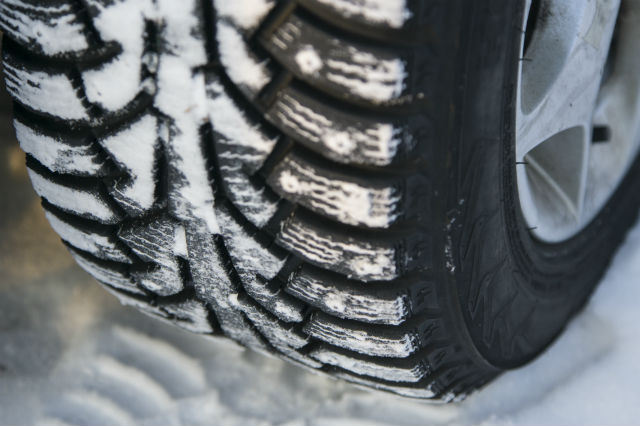When winter arrives, cold weather, snow and ice can wreak havoc on your car and be potentially dangerous if your automobile isn’t properly winterized. One of the most important steps to take is considering a switch to winter tires. These tires are specifically designed to handle snowy and icy road conditions, as well as cold temperatures, which can harden all-season tires and reduce traction.
Proper tires go a long way in keeping you safe. After all, they are the only part of the car that touches the ground.
Do I Need Winter Tires?
The answer to this question depends mostly on where you live. If you experience just a few light snowfalls during the winter, you’ll most likely be fine with all-season tires. However, if you travel over snowy roads throughout the season, you should consider switching over to winter tires.
All-season tires are designed to be just that: tires that will be effective and efficient throughout the year. This works well during warmer months, as all-season tires have the proper traction and tread to handle clean, dry roads while maintaining peak fuel efficiency. But a tire designed to work well for most of the year sacrifices features needed to properly handle driving in cold, snowy weather.
“All-season tires, the type that most vehicles have, are a bit of a compromise,” said John Paul, AAA Northeast’s Car Doctor. “They need to work well in all seasons, at all temperatures…the reality is ‘one size fits all’ isn’t the case.”
“An old rule that I still use is that all-season tires work about 60%-to-70% as well as winter tires in four-to-five inches of snow,” Paul said. “If you need to be out before the snowplows or want the best traction for your vehicle, winter tires are the best option.”
Winter Tires vs. All-Season Tires
Winter tires have specific features that distinguish them from all-season tires. The first difference is the materials from which they are made.
Tire rubber must be flexible in order to grip the road, but the rubber on all-season tires stiffens at a relatively high temperature. The rubber compounds of winter tires, however, are designed differently. “Winter tires have rubber compounds that stay flexible and sticky as the temperatures drop below freezing,” Paul said.
Winter tires also have unique tread patterns and deeper tread depths, which help channel snow and slush and expel water. The tread depths reduce snow buildup, allowing the tires to get better traction.

Buying Winter Tires
There are a few things to consider when switching to winter tires. Whenever possible, it is important to get the same size tires as the ones that are currently on the vehicle. Some sports cars will allow for replacements that retain the same height but have a narrower profile.
Paul suggests always buying four tires and having them installed on spare wheels. “Depending on the vehicle, you may also need to purchase four tire pressure monitors for the four new wheels and tires.”
Once the weather warms up, it’s important to switch back to all-season tires. The softer rubber compounds of winter tires will cause the tread to wear out on dry roads much faster.
Other Tips on How to Winterize Your Car
Check Your Fluids
Not adjusting car fluids could cause them to freeze and damage your car. “The antifreeze/engine coolant should be clean and protect the engine against freezing,” Paul said. “A 50/50 mix of engine coolant and water will protect an engine to 34 degrees below zero.” Other fluids to refill or replace include freeze-resistant washer fluid, transmission fluid, and power steering and brake fluid.
Test Your Battery
Get your battery tested if it’s more than three years old and replaced if it’s more than five years old. Cold temperature limits your car battery’s power output while simultaneously requiring more power to work. “A car engine needs about 30% more energy to start when the temperatures drop to freezing,” Paul said. “And at zero degrees your vehicle battery can only deliver at 50% of its rated capacity.”
AAA will come to you, wherever you are, to test your car battery and replace it if needed. Learn more about AAA Battery Service.
De-Icing
Ice buildup can freeze your car doors shut. If you find yourself in that situation, don’t use hot water. You’ll melt the ice but leave behind more water to freeze later. Use de-icer spray instead but remember – prevention is the key. When it’s dry outside, wipe down the door seals and spray the gaskets with silicone to prevent freezing.
Keep it Clean
Wash your car regularly to get rid of road salt and other chemicals that cling to the undercarriage and cause rust. If the rubber on your vehicle’s wiper blades leaves streaks behind, replace them.
Have a question for our Car Doctor? Ask him here.
Find more info on keeping your car running smoothly all year long.
This article has been updated and republished from a previous version.
3 Thoughts on “Winter Tires and Other Tips on How to Winterize Your Car”
Leave A Comment
Comments are subject to moderation and may or may not be published at the editor’s discretion. Only comments that are relevant to the article and add value to the Your AAA community will be considered. Comments may be edited for clarity and length.
















I think it greatly depends on the vehicle. I travel back and forth to Northern VT from the Boston area all winter through all conditions. I have a GMC Yukon that plows through snow with no problem and those are stock all-season tires. My Grand Cherokee actually has summer tires that have to be swapped (I looked up the tires online and it says the warranty is void if you keep them on all year) out for snow tires which I switch out. On the Cherokee, it makes a huge difference.
I will never have a car again without winter tires and a limited slip differential. I’ve done a lot of reading and watched a lot of vehicle tire traction tests. As I often have to get to work at 5 am I’m sold. The confidence it gives me were worth the expense of an extra set of tires, rims and pressure sensors.
I remember years ago my Grandfather using studded snow tires before the innovation of all season radials. Nowadays no one wants the expense of purchasing snow tires having to have them changed in the fall and back in the spring, bringing the tires home and having to store them somewhere until the following season, not convenient for many apartment dwellers. I can also remember years ago, the state of Massachusetts having two vehicle inspections, spring and fall. If you still had your snow tires on your vehicle your vehicle would not pass the spring inspection.